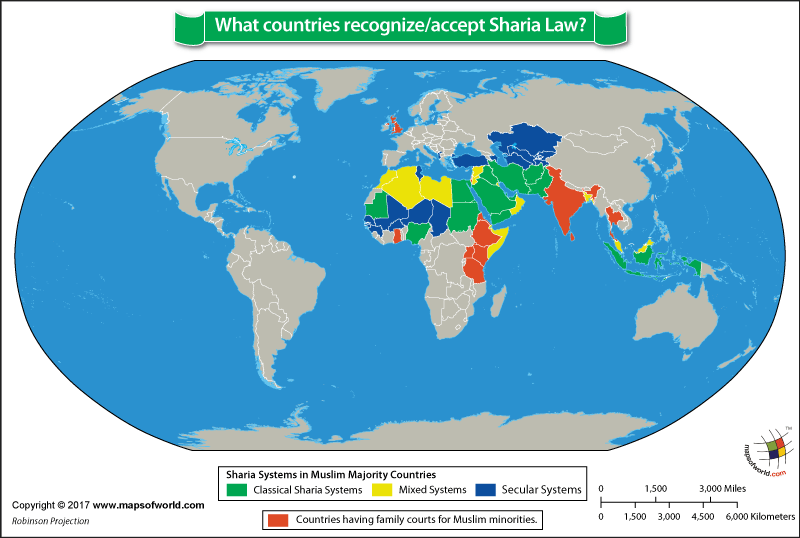

World map highlighting countries which recognize sharia law
Sharia is the Islamic law but in actuality is much more than merely a system of laws. It is a comprehensive code of behaviors that govern both private and public activities of Muslim individuals. It includes the discipline and principles that govern the interactions between communities, groups, and social and economic organizations. It governs the behavior of Muslim individuals towards themselves, their family, neighbors, community, city, nation and the Muslim polity as a whole.
The most comprehensive categorization of countries that recognize Sharia Law in their legal systems was done by Professor Jan Michiel Otto of the Leiden University Law School in the Netherlands. He states 3 categories of Muslim countries that recognize Sharia Law:
In these countries, Sharia law enjoys the official status or a high degree of influence on the legal system. It covers family law, criminal law, and in some places, personal beliefs, including penalties for apostasy, blasphemy, and not praying.
These are mostly Muslim majority countries. Under this category, Sharia covers family law while everything else is covered by the secular courts.
These are some of the Muslim majority countries where Sharia plays no role.
However, there are certain countries that have Islamic family courts available for their Muslim minorities. These are:
In the United States, there are no Islamic Courts but in some cases, Islamic Law has to be considered while making a decision. One example is that a court may have to check the validity of an Islamic marriage contract from a Muslim country in order to grant a divorce in the US.
Sharia means path or way in Arabic. It was systematized between the 8th and 10th centuries, some 200 to 300 years after Muhammad received his first revelation. Sharia has many sources including the Koran, the Hadith (account of the sayings and actions of the Prophet and his companions) and scholarly interpretation and case law dating back to hundreds of years.
Within Sharia Law, there is a specific category of offences called the Hadd offences that entail specific penalties that are most often corporal punishments. These include stoning, lashes or the severing of a hand. In this respect, using Sharia as an excuse, Islamic militant groups in Afghanistan, Somalia, and Syria, and governments in Iran, Saudi Arabia, the Aceh state in Indonesia have issued corporal punishments.
One instance is when in 2002, a civil unrest broke out in Nigeria sparking the debate over how far the rule of Sharia might be spread when a 30 year old woman accused of adultery was sentenced to death by stoning by an Islamic Court in the country. The sentence specified the accused be buried up to her neck in sand and have rocks thrown at her head.
Some Islamic scholars are of the opinion that Islamic beliefs cannot be enforced upon the individual by the state. They hold that the belief in Sharia can only come from the individual and not because the state has codified it.
In recent times, many states in America and other countries have started questioning whether Sharia Law can be allowed to interfere with the civil law of the land. Many states in the US have passed legislations banning the application of any foreign law, legal code or legal system that doesn’t grant the same rights and privileges as the state or US Constitution. Although not mentioned directly, these laws are said specifically be anti-Sharia.
Related Maps:
The Republic of Madagascar is an island country located in the Indian Ocean, off the…
The Euro is the official currency of the European Union. It is, however, not incumbent…
There are many countries or regions that are partially recognized by the UN, have disputes…
The Alaska Statehood Act was signed into law by President Dwight D. Eisenhower in 1958,…
The name Persia may, however, only be used to refer to Iran in some contexts.…
Hawaii is an Island State in the US. It is one of the 50 states…